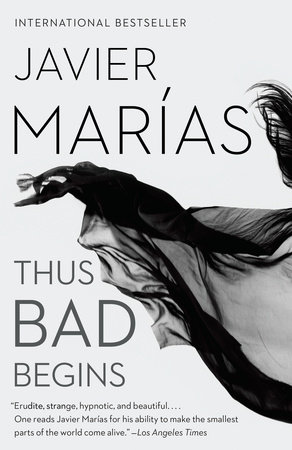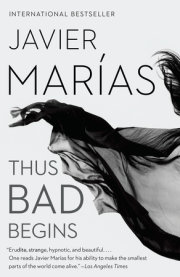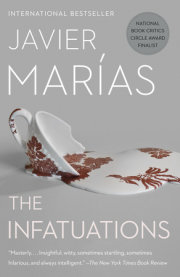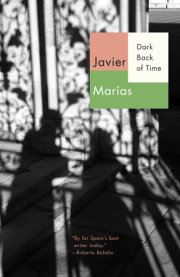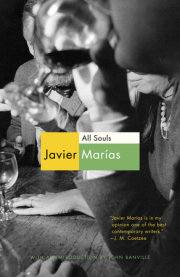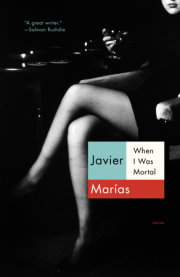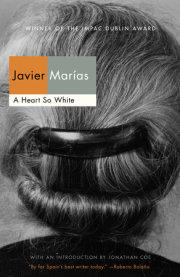Eduardo Muriel had a thin moustache, as if he had first grown it when the actor Errol Flynn was still around and had then forgotten to change it or allow it to grow more thickly, one of those men of fixed habits as regards his appearance, the kind who doesn’t notice that time passes and fashions change nor that he himself is growing older— it’s as if time did not concern him and so could be discounted, rendering him immune to its passing—and up to a point he was right not to worry about it or to pay it any attention: by attaching no importance to his age, he kept it at bay; by not giving in to it in external matters, he rejected it, and so the timid passing years—which make bold with almost everyone else—prowled and stalked, but didn’t dare to claim him, did not take root in his mind or affect his appearance, merely casting upon it a very slow shower of sleet or shadow. He was tall, well above average height for a man of his generation, the generation just after my father’s or possibly the same one. At first glance, his height made him seem strong and slim, although he didn’t exactly conform to the manly stereotype: he had rather narrow shoulders, which made his belly seem larger, even though he carried no excess fat there or on his hips, from which emerged a pair of very long legs that he didn’t know quite what to do with when he sat down: if he crossed them (and that, generally speaking, was his preferred position), the foot of the upper leg easily touched the floor, a pose also achieved—albeit by artificial means and with the aid of foreshortening and high heels—by certain women who are particularly proud of their calves and who prefer not to leave one leg dangling free or to become pushed out of shape by the supporting knee. Because of his narrow shoulders, Muriel used to wear jackets with carefully disguised shoulder pads, I think, or perhaps his tailor cut them in the form of an inverted trapezium (in the 1970s and 1980s, he still went to see his tailor or his tailor came to him, which was unusual even then). He had a very straight nose, with not a trace of a curve despite its good size, and his thick, predominantly dark brown hair (parted with a wet comb as doubtless his mother had done ever since he was a child—a tradition he had seen no reason to break with) had a sprinkling of grey. His thin moustache did little to diminish his bright, spontaneous, youthful smile. He tried to restrain that smile or repress it, but often failed, because there was in him an underlying spirit of joviality, or a past self that emerged easily and without the need to send a sounding line down very deep. Nor, on the other hand, was it to be found in very shallow waters, for in those there floated a certain bitterness, either habitual or unconscious, of which he felt he was not the cause, but possibly the victim.
The most striking thing about him, though, when one saw him for the first time or came across a rare full-face photo in the newspaper, was the patch he wore over his right eye, a classic, theatrical or even filmic eyepatch, black and bulky and held in place by a thin black piece of elastic. I have always wondered why such eyepatches have a rough surface, I don’t mean the cloth ones intended only as temporary protection, but the permanent, fitted ones made of some stiff, compact material. (It looked like Bakelite, and I often felt tempted to drum on it with my fingernails to find out how it felt, not that I ever tried this with my employer; I did, however, find out what it sounded like, because sometimes, when he was upset or irritated, but also whenever he paused to think before uttering a sentence or embarking on a speech, with his thumb tucked under one armpit as if it were the tiny riding whip of a soldier or a cavalryman reviewing his troops or his mounts, Muriel did exactly that, drumming on his eyepatch with the fingernails of his free hand, as if summoning the aid of his non-existent or useless eye; he must have liked the sound it made and it was rather pleasing, toc, toc, toc; although until one got used to the gesture it did make one cringe slightly, to see him invoking his absent eye.) Perhaps the somewhat bulky shape of the patch is intended to give the impression that there is an actual eye underneath, when there might only be an empty socket, a hollow, a dent, a depression. Perhaps those patches are convex precisely in order to contradict the awful concavity that, in some cases, they conceal; who knows, perhaps the cavity is filled by a polished sphere of white glass or marble, with the pupil and the iris painted on with pointless, perfect realism, an eye that will never be seen, always covered in black, or seen only by its owner at the end of the day, when, standing before the mirror, he wearily uncovers or perhaps removes it.
And while the patch inevitably drew one’s attention, his useful, visible eye, the left one, was no less striking, being of an intense dark blue, like the sea at evening or perhaps at night, and which, because it was alone, seemed to notice and register absolutely everything, as if it possessed both its own faculties and those of the other invisible, blind eye, or as though nature had wanted to compensate for the loss of its pair by making it more than usually penetrating. Such was the energy and speed of the left eye that I would, gradually and furtively, try to place myself out of its reach so as not to be wounded by its piercing gaze, until Muriel would tell me off: “Move a little to the right, I can barely see you there unless I lean sideways. Don’t forget, my field of vision is more limited than yours.” And at first, when I didn’t know where to look—torn between that living, maritime eye and the dead, magnetic patch—he would have no hesitation in calling me to order: “Juan, I’m talking to you with the seeing eye, not the dead one, so please listen and don’t get distracted by the eye that isn’t saying a word.” Muriel would openly refer to his halved vision, unlike those who draw an awkward veil of silence over any personal defect or disability, however conspicuous and dramatic: people who have had one arm amputated at the shoulder, but who never acknowledge the difficulties they face and do just about everything short of taking up juggling; one-legged people who scale Annapurna on crutches; blind people who go to the cinema and then make a fuss during the scenes with no dialogue, complaining that the image is out of focus; disabled people who pretend they’re not wheelchair-bound and insist on trying to climb stairs rather than using the ramps that are available everywhere nowadays; men with heads like billiard balls, who, whenever there’s a gust of wind, are constantly smoothing their non-existent hair and getting frustrated with their imaginary unruly mop. (Not that I’m criticizing them in the least, of course, they’re free to do exactly as they like.)
But the first time I asked him what had happened to his eye, how his silent eye had been struck dumb, he replied as brusquely as he did sometimes to people who annoyed him, although he rarely did so with me, for he usually treated me with great kindness and affection: “Let’s get one thing straight: I don’t employ you to ask me questions about matters that are none of your business.”
Copyright © 2016 by Javier MarÃas. All rights reserved. No part of this excerpt may be reproduced or reprinted without permission in writing from the publisher.

